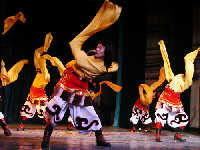 |
|
A performance ofKing Gesar
|
King Gesar is a heroic epic collectively created by China's Tibetans. Originating via folk oral traditions,
King Gesarwas passed down through the generations in a combination of song and narration for over 1,000 years. So far, King Gesar has been collected in more than 120 volumes, with more than one million verses (over 20 million words) -- 25 times the length of the Western classic, Homer's
Iliad.
King Gesar, the greatest work of Tibetan literature, is easily the longest epic in the world, which has also appeared in ballads among the Mongols and Tus.
King Gesar of the Ling Kingdom was born in the 11th century as the son of the supreme god Indira. As a boy, he was very mischievous, but divine by nature and full of supernatural powers. His greatest enemy was his uncle -- a cowardly, vain and pretentious man who hoped to rule the country. Although the hero and his mother were banished, Gesar's exile enabled him to nurture his hidden strengths. He emerged victorious in a horse race to become king of the nation. King Gesar then began conquering the "kingdoms of demons" -- the Jiang and Hor (northern Mongolian people) kingdoms. The war between the Ling and Hor kingdoms constituted one of the central parts of the story. It began with a beautiful girl, Qomu, who was King Gesar's queen. The Hor king, also known as the "White Tent King," heard about her beauty and sent for her. When his request was refused, he sent troops to attack the Ling kingdom. After several battles, another girl was sent to the Hor king in the place of Qomu. But once the truth was uncovered, the battles resumed. The Ling capital, along with Queen Qomu, was finally captured by Hor troops. But King Gesar organized all his troops with the help of an important Hor general, captured the Hor capital, killed the White Tent King and rescued his queen.
In Tibetan-inhabited areas Gesar was known as the king of the ancient Tibetan kingdom of the Ling. The great hero and his brave army are kept alive in the rich, imaginative retellings of the epic. From early times, the epic was passed on orally. Today, a small number of inscribed woodblocks of the epic can be found in Lhasa, Xigaze and Dege County in Sichuan Province; a few handwritten copies are also dispersed among some families. The Potala Palace contains a statue of Gesar, which still attracts pilgrims on a daily basis. Gesar's deeds were recorded in the Kangba region more than anywhere else, and handwritten and printed versions of Gesar from Dege are considered the most authoritative works. People still argue that the village of Ngaxu in Northern Dege County was the birthplace of Gesar.
